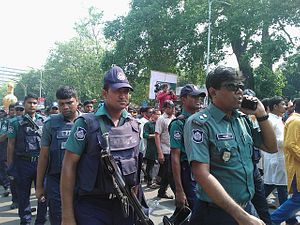The peace-loving citizens of my country and some of our foreign guests have been hit by tragic acts of violence in recent months. Over the past two years, extremists aligned with the Bangladesh Nationalist Party and Jamaat-e-Islami have staged disruptive strikes and killed hundreds of innocent Bangladeshis by derailing trains, fire-bombing buses, and even hacking victims to death in broad daylight with machetes. Now, extremists have targeted writers and foreign nationals.
Throughout its 44-year history, Bangladesh has developed a reputation for being tolerant, even welcoming, of visitors. It is precisely because of this reputation that the government is taking the attacks very seriously and is responding in multiple ways to increase security and apprehend and prosecute the perpetrators.
Much speculation has swirled around the violence, and the government has been accused by some of not doing enough to respond. Nothing could be further from the truth. Instead, authorities have made the investigations their highest priority and have made numerous arrests.
With assistance from the U.S. Federal Bureau of Investigation, Bangladeshi authorities have arrested eight people in connection with the February killing of U.S. citizen and blogger Avijit Roy.
In the September murder of Italian citizen and aid worker Cesare Tavella, authorities have arrested four suspects, three of which confessed they were ordered to do the killing by a “big brother.” Following this lead, police arrested a high-ranking official of the Bangladesh Nationalist Party.
Authorities have also arrested two suspects in the October slaying of Japanese citizen and social worker Kunio Hoshi.
In the grenade attack carried out on the Shiite Tazia Procession in October, authorities have arrested four suspects, recovered safety locks belonging to the grenades used in the attack and formed a high-level committee to speedily probe the incident.
Indeed, Bangladesh authorities have made arrests in each and every recent high-profile crime. And two trials already are underway in courts that are transparent and open to the public.
In addition, the government and local authorities are substantially increasing their efforts to protect the lives of foreigners and Bangladesh citizens who have received threats.
The government has ramped up security in Dhaka’s diplomatic sector, increasing the number of check points, mobile units and visible security. In addition, plainclothes security officers have been assigned to these areas, and the travel routes and recreational areas frequented by foreign guests have been fortified.
The government has formed a special task force to monitor terrorist activities in order to defuse attacks before they take place. The task force is concentrating on ensuring the security of foreigners. Outside of Dhaka, regional and local governments are being instructed to increase security for foreigners residing there.
Government intelligence agencies are increasing their monitoring of terrorist propaganda online and are collecting on-the-ground intelligence on terrorists nationwide.
As for protecting the safety of Bangladesh’s citizens, a number of high-profile members of the country’s civilian society already receive regular security. Similar protections are available to other citizens who report threats to the police.
Each of the terrorist attacks has been tragic for the victims, their families and for the nation as a whole. The government is focusing full time on bringing the attackers to justice and preventing similar attacks.
At the same time, it is important to remember that these attacks do not paint an accurate picture about the situation in Bangladesh. According to Gallup’s 2015 Global Law and Order report, Bangladesh fares much better than its neighbors in terms of how people within the country – both natives and foreign guests – perceive their personal safety. A recent United Nations Office on Drugs and Crime study found similar results for Bangladesh.
Prime Minister Sheikh Hasina has a zero-tolerance policy for terrorists. Her government is determined to uphold the nation’s secular democracy and prevent Bangladesh from becoming what too many other nations have become – a breeding ground for terror and a staging area for global attacks. The U.S. and Indian governments have lauded Sheikh Hasina’s leadership in this area.
The government of Bangladesh will continue the zealous prosecution of terrorists and will work around-the-clock to root out the sources of terror.
Sajeeb Wazed is the chief information technology adviser to the government of Bangladesh and the son of Prime Minister Sheikh Hasina.

































